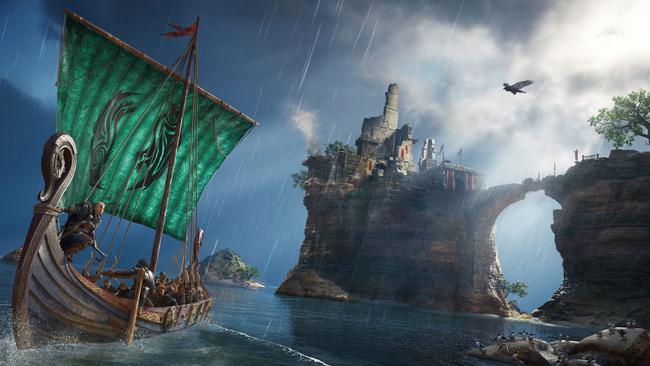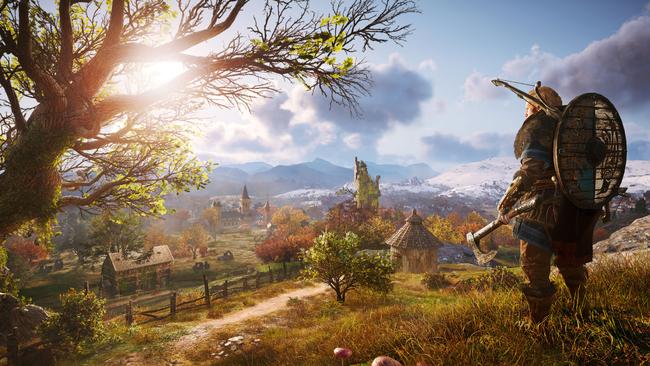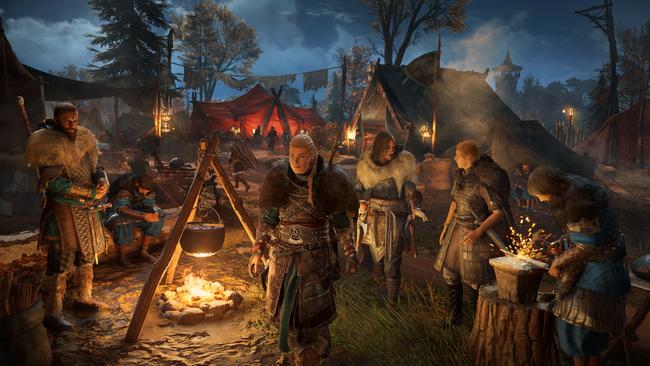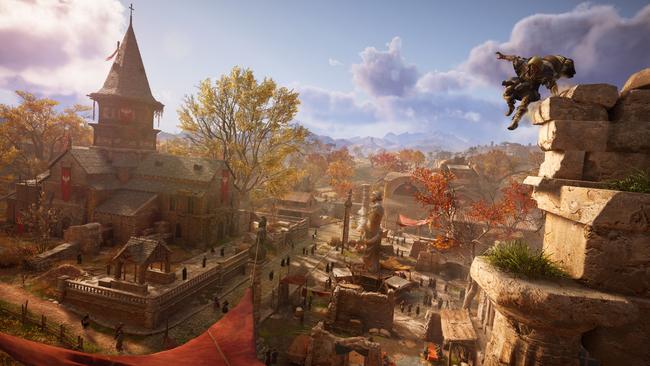The story behind Assassin’s Creed: Valhalla
The past, as LP Hartley famously observed, is a foreign country – and they do things differently there.

The past, as LP Hartley famously observed, is a foreign country – and they do things differently there.
Given time travel is currently impossible and international travel is not far behind for most people at present, it’s fortunate we have video games to let us visit anywhere or ‘anywhen’ we like to experience these differences for ourselves.
One of the best known fixtures in that catalogue is the Assassin’s Creed series of games, which take places across history and concern a millennia-old struggle between The Assassins’ Brotherhood (representing freedom) and The Templars (representing order and control).
The games have always been well-researched but in recent years, starting with 2017’s Assassin’s Creed: Origins, superb attention to historical detail has really come to the forefront of the games – indeed, the settings created in Assassin’s Creed: Origins (Ancient Egypt) and Assassin’s Creed: Odyssey (Classical Greece) are so realistic and detailed, that Ubisoft released a version of the games without any combat.

While this might sound odd, it is an excellent example of video games’ potential to provide insight and information as well as entertainment – and it’s a trend Ubisoft have kept going with their latest game, Assassin’s Creed: Valhalla.
The newest instalment in the Assassin’s Creed series takes place in 9th Century Britain, in the latter part of a period often casually referred to as The Dark Ages.
Covering the period following the Roman departure from Britain, and the start of what we think of as the Medieval era, the Dark Ages haven’t had a strong presence in popular imagination beyond “Vikings” and “King Arthur”, and a vague idea everyone lived in monasteries or stick huts and was covered in mud.
The reality was vastly different however – and something the game does an outstanding job of recreating, right down to showing that “The Dark Ages” weren’t as dark as we tend to imagine.
Lucie Malbos is a lecturer in medieval history, specialising in the Viking Era, at the University of Poitiers, said the meaning of the term “Dark Ages” had changed over the years – referring to the same period of history, but for a different reason.

“The Dark Ages is a very interesting expression – I like it. You can understand it on many different levels,” she said.
“Most people understand it as barbarian times and ignorance, a lot of violence and blood. It’s a value judgement … this term is not welcome among historians now (because of that reason).
“Some people are open to keeping the expression, but not in the term of barbarian times – from the 5th Century to 11th Century – they are dark not because of barbarians, but because historians have very few sources (from that era).”
Ms Malbos said two of the common misconceptions about the Vikings (who hailed from Scandinavia) was they were a singular group and were exclusively about raiding, looting and pillaging, when none of those things were true.
“Viking is not a geographical or ethnic origin – it is someone who is taking a boat and crossing the sea to find wealth and riches,” she said.
“You can do it by looting or raiding – you can also do it by trade.
“A Viking can do both – trading or raiding … It’s about doing something, not being someone.”

Vikings were famous seafarers and people generally do not realise just how far they ranged – in addition to their excursions to Britain and Ireland, Vikings could be found throughout the Near East and even the Mediterranean too.
“They (Vikings) went to Mediterranean world via Russian lands and rivers such as the Volga; there was lots of trade with Arabic world,” Ms Malbos said.
The most famous Viking accomplishment would be crossing the Atlantic to North America several centuries before any other Europeans – a feat initially referred two in two 13th Century written versions of much older Sagas, referring to events around 1000AD.
The voyages were considered historically somewhat questionable until the 1960s when excavations at L’anse Aux Meadows in the Canadian province of Newfoundland definitively confirmed the Vikings had established a presence there – to date, the only confirmed Viking settlement in North America, despite records indicating timber-gathering and fishing visits to elsewhere in what is now Atlantic Canada until possibly as late as the 1400s.
Playing a highly researched historically set game like Assassin’s Creed: Valhalla can offer players a real insight into the past; bringing an era to life in an immersive and interactive way that’s almost like a virtual living history experience.

The Ubisoft research team are well known for doing incredibly detailed research into the time periods for their games – in 2016 they recreated a linguistically plausible Stone Age language for Far Cry Primal – and it’s very clear that same attention to detail has been brought to bear on Assassin’s Creed: Valhalla.
While some allowances have to be made for entertainment, gameplay and creative purposes, the game still goes to great pains to create a believable Viking environment – members of the development team even went as far as to visit sites in Britain and Norway and sail through fjords in a replica Viking Longship to make sure they captured the essence of the era and what it meant to live then.
Despite trading and raiding through England for nearly two centuries, the Viking Era in the country ended abruptly in 1066 following the Viking defeat at the Battle of Stamforth Bridge – which was itself overshadowed by the history-changing Norman victory at Hastings almost three weeks later.
Ms Malbo said as a historian, the important thing she would like people to understand about the Viking Era in Britain is that its legacy is still felt today, more than 1000 years later.
“We have this impression they (Vikings) disappeared in the next century (following 1066) – but they put a strong imprint on the English world and English civilisation, including their vocabulary – so in a way they’re still there,” she said.
Royce Wilson’s review of Assassin’s Creed: Valhalla will be published next week.



To join the conversation, please log in. Don't have an account? Register
Join the conversation, you are commenting as Logout